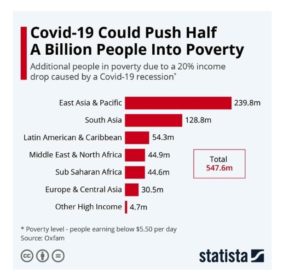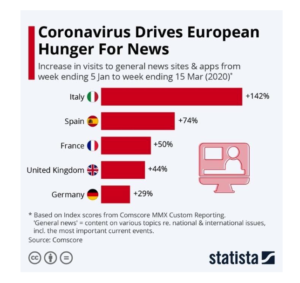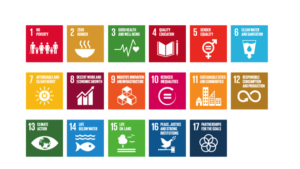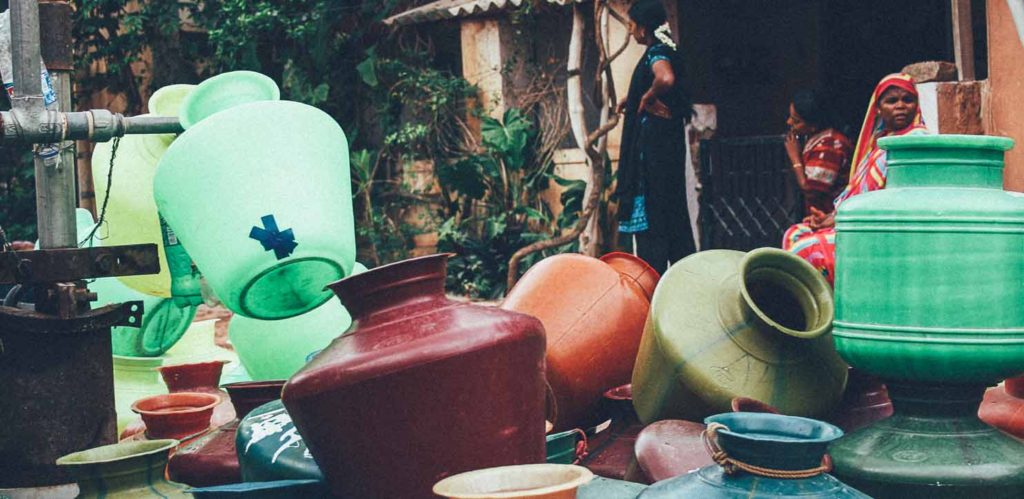It comes as no surprise to anyone why Coronavirus continues to fill our minds, conversations, and headlines; after all, the word ‘pandemic’ comes from the Greek term ‘pandêmos’, which translates into “common to all the people”. Talk about the virus has touched upon sustainability – think of photographs of the unpolluted Venice canals, broadcasted critique of flawed healthcare providers, and disrupted education systems. Nevertheless, thinking about broader consequences of the COVID urges us to recognize that there is one feature of the United Nations Sustainable Development Goals (UNSDGs) that has been left out – trustworthy and accurate information dissemination.

The More You Know
The compatibility between knowledge and the news cannot be understated. One would find it difficult not to visualize images of injustice, natural disasters, and economic bumps when they consider recent media coverage. As a driver of educated decision-making, policy, and general awareness, the news is instrumental in the path to progress – with some deeming the industry another branch of the government.
Reflect upon your own individual news consumption during the pandemic – what were your chosen platforms? How did they affect your behavior? Many may conventional news streams, podcasts, word-of-mouth, and WhatsApp, as their go-to sources, directly influencing those in friends, family, and colleagues. And now wonder, how did you know this news was truthful? The growth of news sharing facilities has diminished accuracy and led to information fabrication. In the COVID era, non-neutrality fuels misinformed and vulnerability.
Thousands have been estimated to have died due to misinformation in this year alone, while 88% of surveyed Americans say they are confused by ‘fake news’. Regional disparities paint a bleaker picture, with India’s debunked news pieces increasing day upon day during lockdown and Brazil’s attempts to withhold COVID statistics. A Wikipedia page dedicated to COVID-19 related misinformation, fact-checking explorer tools, and public service announcements are some of the instruments preventing the spread of wrong data.
COVID is a humanitarian crisis, jeopardizing the wellbeing of the global community. Like the crises that came before it, information is needed here to drive action, strategy, and resource mobilization. The Centers for Disease Control and Prevention (CDC) have reiterated this, asserting that the media plays an unparalleled role in emergency situations. The infographic below concurs, implying that Western Europe’s demand for news grew by 29-142% in the first quarter of the year. A rise in falsified news harms human and ecological interests, especially in a time where knowledge is the key gatekeeper of peace and progress.

News distributors are making strides in ensuring that their information links with sustainable development. For instance, the BBC and The Guardian have installed procedures to confirm that topics like climate change are discussed with the authority they are due; the SDG Media Compact commits to relating news with the UNSDGs, and the Brookings Institution diligently reports on UNSDG coverage in international media. As the spread of this virus intensifies, we turn to the priorities laid out in the development goals to stay afloat – focusing on wellbeing, sanitation, and reduced inequalities. Yet, disregarding a fundamental guide to navigate out this maze is unwise to say the least. The UNSDGs must evolve to include an 18th goal in their roadmap to 2030, to support the fair and just distribution of knowledge, creating the ability to truthfully deliver information globally.

Excluded From This Narrative
Given the fact that almost 213 countries and territories are grappling with cases, with some seeing second, and even third, waves of infection, being overwhelmed by COVID-related news is expected. Uncertainty over when things will go back to ‘normal’ with many nervous about how they will get by day to day has brought about a melting pot of information distribution, serving to confuse more than conciliate.
The demand for positive news in the midst of this disaster has pushed many platforms to broadcast the ecological advantages of lockdown – indicators have been published to link the virus to the largest ever annual fall in CO2 emissions. Photographic evidence of thriving wildlife support a much purported notion that the virus has been ‘good’ for the environment, which the public has responded to with optimism. Unfortunately, although favorable to masses, this notion is equal parts imprecise and harmful. June ended with China’s CO2 emissions surging past pre-coronavirus levels, as well as Europe seeing more traffic flows. The Amazon rainforest continues to burn while social distancing has rendered effective waste management, such as recycle pick up, completely redundant in some areas of the United States with illegal waste disposal rising over 300% in the United Kingdom. The environmental degradation that the world continues to see fails to be addressed by information distributors, in favor of a more ‘cheerful’ narrative. Discounting the importance of this will only recede the innovations made in sustainable development.
Another adopted outlook arising from this knowledge bias is the growth of modern ‘ecofascism’ – an ideology that necessitates humans forgo their interests in favor of a ‘pure’ socioecological sphere. Tweets and Instagram posts have gone so far as to deem humankind as ‘the virus’ and COVID as the ‘vaccine’. This tacit compliance with ecofascism demonizes certain populations more than others, and has revived a rise in racism against developing countries, prejudice against poorer communities, and even anti-Semitism. It is no surprise that the UNSDG Number 10 – Reduced Inequalities, is under a great deal of stress, as frontline workers and developing economies remain the hardest hit groups, thus increasing global imbalances. The objective of information should be to move beyond what is popular, to deliver what is necessary, to strengthen the collective and fix budding problems.
An information war of sorts is being fought on the COVID battlefield, at a time where unification and improvement should be primary. Introducing accountability and fact-checking into social media will be another task that should be tackled in the new development goal.
Proceed With Caution
The enactment of an information regulating goal must be done carefully to guarantee that freedoms pertaining to speech and well-intentioned dialogue are maintained. For this, we can consider existing safeguards and push for research into policy framework in this area.
Bearing in mind that international organizations have the advantage of resources and scale to manage information, UN agencies are the best poised entities to take on this responsibility. Director of Policies and Strategies at United Nations Educational, Scientific and Cultural Organization (UNESCO), Guy Berger, expressed concern over truthful reportage during the COVID crisis by stating, “When disinformation is repeated and amplified, including by influential people, the grave danger is that information which is based on truth, ends up having only marginal impact.” UNESCO’s efforts in this scope include publishing a guidebook for journalists to foster critical thinking, information literacy, and appropriate social media usage. While the handbook now caters solely to journalists, these teachings can be expanded upon in the future to advise broader information platforms and social media users. Likewise, the World Health Organization (WHO) has been a trusted leader in present times, and has done its bit to fight falsehoods by adding a ‘mythbusters’ section to its website, refuting circulating news that holds no merit – i.e. some ethnicities being more immune to COVID than others, and certain non-proven treatments being effective against the virus. The onus to create a system pushing for correct knowledge should be fueled and supported by establishments with the privilege to create this change.
Solutions surrounding information dissemination can only come about via discourse and study. The UNSDGs were set in 2015, and the world has since seen unprecedented times – it is only logical that amendments and inclusions be integrated into the framework in response. Closing the information vacuum and modifying the knowledge sharing community will be time-consuming, but the pandemic has revealed that it is most certainly a necessity today – after all, knowledge is power.

Maryam believes in making sustainability practices approachable, versatile, and practical. She views the written word as a critical tool to drive and accelerate positive change, and identifies strongly with Sustainable Square’s principles of creating progressive ESG solutions for global commerce.


